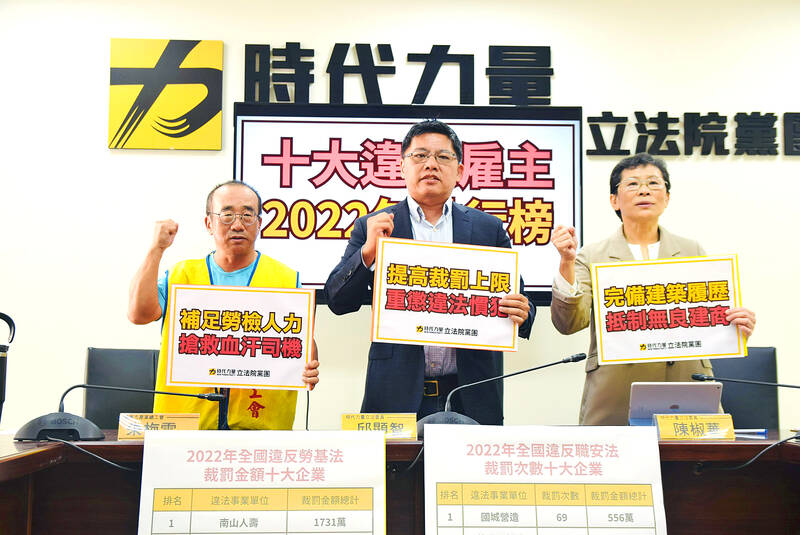New Power Party (NPP) lawmakers yesterday named Nan Shan Life Insurance Co and Taiwan Semiconductor Manufacturing Co (TSMC) as among the nation’s top enterprises most fined for contraventions of labor law, in a call for stronger legal protections for workers’ rights.
Taiwan must enhance penalties for enterprises that contravene the Labor Standards Act (勞動基準法), NPP legislators and representatives of the Taoyuan Confederation of Trade Unions told a news conference at the Legislative Yuan in Taipei, citing Ministry of Labor data.
Nan Shan Life Insurance topped the list after receiving labor rule violation fines of NT$17 million (US$532,448), an amount that nearly equaled the sum of the next nine companies’ fines combined, NPP Legislator Chiu Hsien-chih (邱顯智) said.

Photo courtesy of the New Power Party caucus
This behavior “suggests the company believes it is above the law,” Chiu said.
Carrefour Taiwan, which frequently appeared in previous editions of this ranking, incurred fines worth NT$4.34 million in connection to labor rule violations, making it the second-worst this year, Chiu said.
TSMC was the next-worst employer on the list, having been fined NT$2 million last year, he said.
Breaking rules on overtime pay, illegal overtime practices and failing to comply with work-hour regulations are the three most common labor regulation violations, Chiu cited ministry data as showing.
The manufacturing, retail, hospitality and restaurant, transportation and warehouse industries were the most prolific breakers of work hours and overtime regulations, he said.
Labor law stipulates that enterprises that contravene labor regulations can be fined up to NT$1 million, which offers no deterrence, he said.
The NPP caucus has proposed amendments to the labor law that would triple the fines for non-compliance to ensure the dignity of labor is upheld in Taiwan, he said.
The remainder of the rule-breaking enterprises were Taoyuan Bus, Zhinan Bus Co, Hualien Passenger Transport Co, Kuang-Hua Bus Co, United Highway Bus Co and Grape King Bio Ltd, union chief executive officer Chu Mei-hsueh (朱梅雪) said.
This means six out of 10 of Taiwan’s employers with the worst labor records are from the transportation industry, she said, adding that there is hardly ever a year that goes by without the bus companies being caught committing wage theft, illegal overtime practices or overworking employees.
The industry “takes subsidies in one hand and pays fines out the other,” she said.
The nation’s shortage of labor inspectors — many of whom are working longer hours than legally allowed and being underpaid like the workers they were supposed to protect — shows that the Ministry of Labor has some labor standards problems itself, Chu said.
The ministry has a shortage of inspectors and is largely under-resourced at the local level, she said.
NPP Legislator Chen Jiau-hua (陳椒華), who presented a list of construction companies with the highest number of Occupational Safety and Health Act (職業安全衛生法, OSHA) violations, said all entities on her list were construction companies.
The worst offender of the group was Kuocheng Construction (國城營造), which was fined 69 times for a total of NT$5.56 million, she said.
This figure averaged out to six OSHA breaches per month, and the ministry’s heaviest penalties seems to have no effect on the company’s behavior, Chen said.

Taiwan is stepping up plans to create self-sufficient supply chains for combat drones and increase foreign orders from the US to counter China’s numerical superiority, a defense official said on Saturday. Commenting on condition of anonymity, the official said the nation’s armed forces are in agreement with US Admiral Samuel Paparo’s assessment that Taiwan’s military must be prepared to turn the nation’s waters into a “hellscape” for the Chinese People’s Liberation Army (PLA). Paparo, the commander of the US Indo-Pacific Command, reiterated the concept during a Congressional hearing in Washington on Wednesday. He first coined the term in a security conference last

Prosecutors today declined to say who was questioned regarding alleged forgery on petitions to recall Democratic Progressive Party (DPP) legislators, after Chinese-language media earlier reported that members of the Chinese Nationalist Party (KMT) Youth League were brought in for questioning. The Ministry of Justice Investigation Bureau confirmed that two people had been questioned, but did not disclose any further information about the ongoing investigation. KMT Youth League members Lee Hsiao-liang (李孝亮) and Liu Szu-yin (劉思吟) — who are leading the effort to recall DPP caucus chief executive Rosalia Wu (吳思瑤) and Legislator Wu Pei-yi (吳沛憶) — both posted on Facebook saying: “I

The Ministry of Economic Affairs has fined Taobao NT$1.2 million (US$36,912) for advertisements that exceed its approved business scope, requiring the Chinese e-commerce platform to make corrections in the first half of this year or its license may be revoked. Lawmakers have called for stricter enforcement of Chinese e-commerce platforms and measures to prevent China from laundering its goods through Taiwan in response to US President Donald Trump’s heavy tariffs on China. The Legislative Yuan’s Finance Committee met today to discuss policies to prevent China from dumping goods in Taiwan, inviting government agencies to report. Democratic Progressive Party Legislator Kuo Kuo-wen (郭國文) said

The Ministry of Economic Affairs has fined Taobao NT$1.2 million (US$36,900) for advertisements that exceeded its approved business scope and ordered the Chinese e-commerce platform to make corrections in the first half of this year or its license would be revoked. Lawmakers have called for stricter supervision of Chinese e-commerce platforms and more stringent measures to prevent China from laundering its goods through Taiwan as US President Donald Trump’s administration cracks down on origin laundering. The legislature’s Finance Committee yesterday met to discuss policies to prevent China from dumping goods in Taiwan, inviting government agencies to report on the matter. Democratic Progressive Party